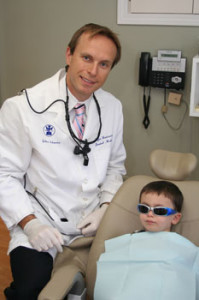PEDIATRIC DENTISTRY
 We welcome children of all ages to our practice and thrive to create a playful, child-, and parent-friendly atmosphere, where our young patients enjoy their dental visits. At Melrose Family Dentistry, we try to motivate and reward by complementing positive behavior, through our “treasure chest” and through our Molar Money program
We welcome children of all ages to our practice and thrive to create a playful, child-, and parent-friendly atmosphere, where our young patients enjoy their dental visits. At Melrose Family Dentistry, we try to motivate and reward by complementing positive behavior, through our “treasure chest” and through our Molar Money program
Regular dental visits
How often should a child see a dentist?
The American Academy of Pediatric Dentistry recommends a dental checkup at least twice a year for most children. Some children need more frequent dental visits because of increased risk of tooth decay, unusual growth patterns or poor oral hygiene.
Why visit the dentist twice per year when my child has never had a cavity?
Regular dental visits help your child stay cavity-free. Teeth cleanings remove debris that build up on the teeth, irritate the gums and cause decay. Fluoride treatment renew the fluoride content in the enamel, strengthening teeth and preventing cavities. Hygiene instructions improve your child’s brushing and flossing, leading to cleaner teeth and healthier gums. Dentist may identify orthodontic problems and suggest treatment to guide the teeth as they emerge in the mouth.
What happens in a dental check-up?
The dentist will review your child’s medical and dental history. He or she will gently examine your child’s teeth, oral tissues. The teeth will be cleaned and polished, followed by the application of fluoride solution.
Will X-rays be taken at every appointment?
No. Our practice in accordance with the guidelines from the Academy of Pediatric Dentistry, recommends X-rays only when necessary to protect your child’s health. For example, X-rays may be needed to diagnose tooth decay or abnormalities. Or, they may be required for orthodontic treatment.
How can I help my child enjoy good dental health?
The following steps will help your child be part of the cavity-free generation:
- Beware of frequent snacking
- Brush at least twice a day with a fluoride toothpaste
- Floss once a day
- Have sealants applied when appropriate
- Seek regular dental check-ups
- Assure proper fluoride through drinking water, fluoride products or fluoride supplements.
Thumb, finger and pacifier habits
Why do children suck on fingers, pacifiers or other objects?
This type of sucking is completely normal for babies and young children. It provides security. For young babies, it is a way to make contact with and learn about the world. In fact, babies begin to suck on their fingers or thumbs even before they are born.
Are these habits bad for the teeth and jaws?
Most children stop sucking on thumbs, pacifiers or other objects on their own between 2 and 4 years of age. However, some children continue these habits over long periods of time. In these children, the upper front teeth may tip towards the lip or not come in properly. Frequent or intense habits over a prolonged period of time can affect the way the child’s teeth bite together, as well as the growth of the jaws and bones that support the teeth.
What can I do to stop my child’s habit?
Most children stop sucking habits on their own, but some children need the help of their parents and their dentist. When the child is old enough to understand the possible results of a sucking habit (usually beyond 3 years of age), your dentist can encourage your child to stop. This advice coupled with the support from parents, helps most children quit. If this approach does not work, we might recommend ways to change behavior, including a mouth appliance that interferes with the habit.
Sealants
What are sealants?
Sealants protect the grooved and pitted surfaces of the teeth, especially the chewing surfaces of the back teeth where most cavities in children are found. Made of clear or shaded composite, sealants are applied to teeth to keep them cavity-free.
How do sealants work?
Even if your child brushes and flosses carefully, it is difficult- sometimes impossible – to clean the tiny grooves and pits on certain teeth. Food and bacteria build up in the crevices, placing your child in danger of tooth decay. Sealants “seal out” food and plaque, this reducing the risk of decay.
How long do sealants last?
Research shows that sealants can last for many years if properly cared for. Therefore, your child will be protected throughout the most cavity-prone years. If your child has good oral hygiene nad avoids biting hard objects, sealants will last longer. Your dentist will check and recommend re-application or repair when necessary.
What is the treatment like?
The application of a sealant is quick and comfortable. It takes only one visit. The tooth is first cleaned. It is then conditioned and dried. The sealant is then flowed onto the grooves of the tooth and hardened with a special light. Your child will be able to eat right after the appointment.
How much does it cost?
The treatment is very affordable, especially in view of the valuable decay protection it offers. Most dental companies cover sealants. Some companies, however , have age and specific tooth limitations.
Which teeth should be sealed?
The natural flow of saliva usually keeps the smooth surfaces of teeth clean but does not wash out the grooves and fissures. So the teeth most at risk of decay – and therefore , most in need of sealants – are the six-year and twelve-year molars. Many times the permanent premolars and primary molars will also benefit from sealant coverage.
Dental care for your baby
When should my child first see the dentist?
“First visit by first birthday” sums it up. Your child should visit a dentist when the first tooth comes in, usually between 6 and 12 months of age. This visit will establish a dental home for your child. Early examination and preventive care will protect your child’s smile now and in the future.
Why so early? What dental problems could a baby have?
The most important reason is to begin a thorough prevention program. Dental problems can begin early. A big concern is Early Childhood Caries (formerly known as baby bottle tooth decay or nursing caries). Once a child’s diet includes anything besides breast milk , erupted teeth are at risk for decay. The earlier the dental visit, the better the chance of preventing dental problems. Children with healthy teeth food easily and smile with confidence. Start your child now on a lifetime of good dental habits.
How can I prevent tooth decay from nursing or using a bottle?
At-will breast feeding should be avoided after the first primary (baby) teeth begin to erupt and other sources of nutrition have been introduced. Children should not fall asleep with a bottle containing anything other than water. Drinking juice from a bottle should be avoided. Fruit juice should only be offered in a cup with meals or at snack time.
When should bottle- feeding be stopped?
Children should be weaned from the bottle at 12-14 months of age.
When should I start cleaning my baby’s teeth?
The sooner the better. Starting at birth, clean your child’s gums with a soft infant toothbrush or cloth and water. As soon as the teeth begin to appear, start brushing twice daily using fluoridated toothpaste and a soft, age appropriate sized toothbrush. Use a” smear” of toothpaste to brush the teeth of a child less than 2 years of age. For the 2-5 year old, dispense a pea-size” amount of toothpaste and perform or assist your child’s toothbrushing. Remember that young children do not have the ability to brush their teeth effectively.
Any advice on teething?
From six months to age 3 your child may have tender gums when teeth erupt. Many children like a clean teething ring, cool spoon or cold wet wash cloth. Some parents swear by a chilled ring; others simply rub the baby’s gums with a clean finger.
Emergency Care
In case of an emergency after the regular business hour, please dial our emergency number (781) 467-6951.
What should I do if my child’s baby tooth is knocked out?
Contact your dentist as soon as possible. The baby tooth should not replanted because of the potential for subsequent damage to the developing permanent tooth.
What should I do if my child’s permanent tooth is knocked out?
Find the tooth and rinse it gently in cool water. (Do not scrub or clean it with soap – use only water!) If possible, replace the tooth in the socket immediately and hold it there with clean gauze or a wash cloth. If you can’t put the tooth back in the socket, place the tooth in a clean container with cold milk, saliva or water. Get to the dental office immediately. (Call the emergency number if it is after hours.) The faster you act, the better your chances of saving the tooth.
What if a tooth is chipped or fractured?
Contact your dentist immediately. Quick action can save the tooth, prevent infection and reduce the need for extensive dental treatment. Rinse the mouth with water and apply cold compress to reduce swelling if the lip was also injured. If you can find the broken tooth fragment, place it in cold milk or water and bring it with you to the dental office.
What about a severe blow to the head or a jaw fracture?
You need immediate medical attention. A severe head injury can be life threatening. Keep in mind that an emergency medical team might be able to reach you faster than you can get to the hospital.
What if my child has a toothache?
Call our office and visit the office promptly. To comfort your child, rinse the mouth with water. Over the counter children’s pain medication, dosed according to your child’s weight and age, might ease the symptoms. You may apply a cold compress or ice wrapped in a cloth to the face in the area of the pain, but do not put heat or aspirin on the sore area.

